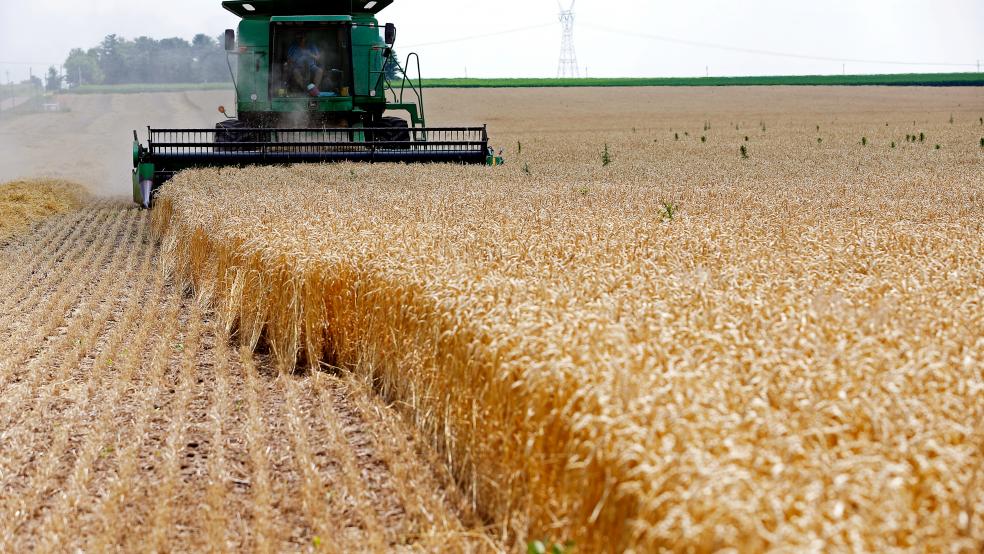The Trump administration is offering $12 billion in emergency aid to American farmers who have been hurt by the president’s escalating trade war with China and other countries.
“This is a short-term solution that will give President Trump and his administration the time to work on long-term trade deals,” said Agriculture Secretary Sonny Perdue.
Speaking at an event in Kansas City Tuesday, Trump said that “farmers will be the biggest beneficiary” of his efforts to secure more favorable trade deals. On Tuesday morning, the president tweeted:
Tariffs are the greatest! Either a country which has treated the United States unfairly on Trade negotiates a fair deal, or it gets hit with Tariffs. It’s as simple as that - and everybody’s talking! Remember, we are the “piggy bank” that’s being robbed. All will be Great!
How it will work: The plan, reportedly in the works for months, has three parts.
- It will provide direct financial assistance for producers of soybeans, sorghum, corn, wheat, cotton, pork and dairy.
- It will rely on the Department of Agriculture’s authority to stabilize the farm economy by buying excess supply. Fruit, nuts, rice, beef, pork and dairy products bought from farmers will be redistributed to federal nutrition assistance programs, according to Politico.
- A “trade promotion program” will work to find new markets for U.S. agricultural products.
The package of programs is authorized under the Depression-era Commodity Credit Corporation Charter Act, according to Agriculture Secretary Sonny Perdue, and thus does not require approval from Congress. The plan will take effect around Labor Day, with the $12 billion total “calculated to match the estimated $11 billion of economic damage that retaliatory tariffs will inflict on U.S. farmers,” officials told The Washington Post.
The response: Lawmakers, business groups and farmers have opposed the president’s tariffs, and while some in the GOP backed the aid plan, a number of Republican free-trade proponents criticized it harshly and expressed concern that access to markets lost under Trump’s trade war won’t be restored.
- “This is becoming more and more like a Soviet-type of economy here: Commissars deciding who’s going to be granted waivers, commissars in the administration figuring out how they’re going to sprinkle around benefits,” said Sen. Ron Johnson (R-WI).
- “Our farmers have been in nonstop, saying they want trade, not aid, and now they’re being put on welfare,” Sen. Bob Corker (R-TN) said, according to the Post.
- “If tariffs punish farmers, the answer is not welfare for farmers — the answer is remove the tariffs,” Sen. Rand Paul (R-KY) tweeted.
- Sen. Ben Sasse (R-NE) said Trump’s trade war “is cutting the legs out from under farmers and White House’s ‘plan’ is to spend $12 billion on gold crutches.”
- Sen. Charles Grassley (R-IA) said the administration’s move was “encouraging for the short term. What farmers in Iowa and throughout rural America need in the long term are markets and opportunity, not government handouts.”
Why it matters: The aid package could have far-reaching economic consequences and will likely play a role in the elections this fall.
- “White House officials hope it will temporarily quiet some of the unease from farm groups, but the new plan could revive debates about taxpayer-funded bailouts and the degree to which Trump’s trade strategy is leading to unforeseen costs,” the Post’s Damian Paletta and Caitlin Dewey write.
- The aid funding may also mean that Trump’s trade war will be going on for some time. “The move is an indication that Mr. Trump — ignoring the concerns of farmers, their representatives in Congress, and even some of his own aides about the adverse consequences of a trade war he says he relishes — plans to plow forward in escalating his tariff tit-for-tat around the world,” The New York Times’s Julie Hirschfeld Davis and Ana Swanson say.
- Election politics may also be at play here. “The administration's trade aid plan is also a bid to shore up support among a slice of the rural electorate ahead of the midterm elections,” Politico said.





